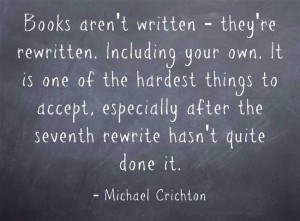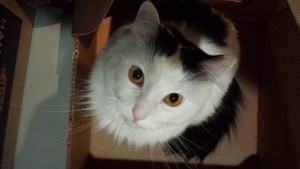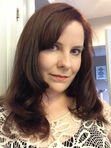Kate Larking's Blog: Anxiety Ink, page 54
February 16, 2015
Revision Doubts
It’s not impossible to tell if you’re writing has improved. Facing a revision is hard. The whole manuscript sits in front of you and the thought of beginning is overwhelming. Where do you begin? What do you change? Are your changes actually improving the story, or is it all just an exercise in futility?
Begin where you need to begin. For me, it’s the beginning. I have to approach it in a linear fashion. I change what doesn’t flow or sound right. I change the things that no longer make sense when I read them. I add when something feels hollow and unsupported and delete what I now see as having no point or purpose.
Revision is an exercise in trust – trust of others, if you have someone in the role of editor, but mostly trust of yourself. Sometimes the latter is harder than the former. If that is the case for you, will you try to trust me on just one thing?
For every draft you finish, you grow as a writer.
You may not always feel it, but each finished draft is a mark of growth. And a necessary aspect of revision is the fact that you have already written something to revise. You know more now than you did when you approached the page for the rough draft, or whatever number draft you have just finished. So have a little faith in yourself.
I faced the insecurities all over again when I rewrote the Damned Novel. My only measuring stick for how I was doing – how much I might be getting right – was purely subjective. Which meant I didn’t quite trust it.
Now that I have begun the revision process, I can see how much stronger than this version is, by the sheer fact of what I find I don’t have to do (note: each prior draft has had at least one of these):
Multiple characters do not need to be combined into one
One character does not need to be split into multiple
No new factions need creation/introduction
An entire subplot does not need to be added and/or developed
Whole chapters are not changing place
Major scenes do not need to be scrapped and/or rewritten
In fact, I don’t think I have to scrap any scene
I do have two scenes to add and one scene to change venue. My antagonist(s) need more development (I always struggle with that). A subplot needs tempering. By and large, I’m not facing much in the way of major changes.
Of course, this is only until an editor tears it apart.
I was afraid that the rewrite would be just as faulty, need just as much work, or even be worse than the old version. But I am a better writer now than when I wrote the very initial draft of this story, and it shows.
So trust yourself. And keep going.
The post Revision Doubts appeared first on Anxiety Ink.
February 12, 2015
Reading Inspiration

It’s fair to assume that most writers are the same in one regard: books inspire us. Whether a book sparks an idea or one picks up a book because they are in need of inspiration, this happens to all of us. Right?
I fall into both camps often. The two even have sub-camps. Sometimes I’ll read a book and be so overwhelmed by the greatness of its characters, topic, narrative, etc. that I’ll want to get out of bed and write until I can’t feel my fingers anymore. I want to create something just as brilliant and an idea will hit me that makes me think I can come close.
Then there are those books you read for fun that are so perfect that it’s crippling. You know, the ones that keep you up all night and when you’ve finally read it front to back you wonder how the hell you’ll ever write something worthy enough to share a shelf with it. I’ve read a few of those. Cried over a few of those.
Or, I’ll finish a book and be left unsatisfied and think, “What if instead….” and my own story is born. I’ll admit this last one where I feel I can improve on a concept has led to a lot more stories than the others. That’s not hubris talking either. Writers are told to write what they want to read all the time. If I’m not 100% satisfied by what I have to read why can’t I fix it with my own twist or explanation?
I have a whole series in my head based on one minor concept in all of the vampire and werewolf stories I’ve read that I don’t like. And believe me, I’ve read more than is probably psychologically healthy.
Moving on to camp two, it’s rare for me to feel the need to pick up a book because I’m stuck and need to see how others handle certain topics or situations. I don’t love resorting to this. I suppose I worry that if I look to another book I’ll accidentally copy parts of it or something. Maybe I feel like a “real” writer will figure it out on their own…
Yet, I have no problem reading books in terms of research. I am a complicated soul. It’s a pain.
I currently have a foot in both camps. For one WIP, I’m reading as many books as I can find set in Oregon. I need help with the treatment of the setting. For another WIP, I’m reading up on a topic I don’t have a lot of hands on experience with. For yet another WIP, the idea has morphed out of a moment I experienced while reading an incredible non-fiction book. Those last two are a long way from being completed so I won’t be saying much more about them. Except that it’s fun to research!
I’m curious, is everyone else as all over the reading-writer map as I am? Or, is there anyone out there who doesn’t find reading inspires their writing –that I would especially love to hear about!
The post Reading Inspiration appeared first on Anxiety Ink.
Poetry to Improve Prose
Every Sunday morning for two hours, I go to an LGBT+ poetry writing workshop. I wouldn’t trade those two hours for anything. The other people in the group are smart, creative people. It’s LGBT+ in that it is a safe place to explore our identities and thoughts around them, and often our writing touches on social justice issues and/or our personal histories and things that require trigger warnings.
Our moderator brings three prompts, and we write for 5, 15, and 20 minutes each. Sometimes (often) the prompts are other poems, but we do fun things like word dice too.
Poetry is really different from fiction in a lot of ways, and it involves thinking about language, white space, theme, in more concrete ways than we tend to in our fiction (at least our first drafts, edits are a separate beast). It turns me inward, where writing a novel turns me outward (I’m writing someone else’s story, after all).
I’m not sure how much we’ve talked about the creative well here at AI, but it is one of the most important concepts in writing to me. The well has to stay full. Reading, going for walks and being in nature, dancing, cooking, sex (between consenting adults), these are all ways of refilling the well. My poetry workshop is a consistent well refiller for me. It makes me want to be creative, to produce, to be better. That is keeping the well fill. Writing depletes the well; I take what I have in there and I pour it out into a novel.
But not only does poetry keep my well full, it keeps it full of quality energy. I am more intentional in my prose because of my poetic inclinations. I am more aware of theme and figurative language, how I use metaphors. Impact.
Writing has impact, and poetry packs a more powerful punch in a smaller space. I feel poetry deep in my bones. Novels, by definition, can’t sustain that kind of intensity. But being a poet helps my novels have more of those moments. It pushes my brain into a different space so that I view novels and writing them just a little bit differently, and that is all me, and as I talked about last week (or as Kate did, in my post, really), THAT is the essence of successful writing.
The post Poetry to Improve Prose appeared first on Anxiety Ink.
February 11, 2015
Looming Deadline Follow-up
This post is a follow-up to last week’s post, Looming Deadlines.
The deadline has come and gone. And I submitted a story.
Clare C. Marshall of Faery Ink Press messaged me that she was in the final stretch of her own story for the submission. And, with that spurring, I got a case of the “I want to be in that club, too!”
So I made a battle plan.
It wasn’t the story I had dreamed up for the anthology call. That idea is still in the to-be-written pile. But I edited a story that I thought might be able to work.
And I worked it.
And then I contacted our own Inkette Jessica Corra. “Can you edit/crit a story tonight?” And she said yes.
So I jumped the hurdles in my first edit and then passed the story baton to her.
I twiddled my thumbs, waiting to hear back.
“OKAY I GET IT!” I e-mailed her. “THIS IS HOW IT FEELS TO HAVE A BOOK WITH AN AGENT. BUT I NEEDS EDITS! In less than 5 hours.”
“GAH I DIDN’T KNOW *THAT*,” Jessica replied. And killed my story faster.
The baton came back and I sprinted, hauling ass to tighten the beginning, add context, rearrange dialogue.
I shoved the story into Submittable and fell, panting.
As I lie on my back, I’m half excited to hear back and half dreading it. But that is the life of the author who submits things, isn’t it?
Moral of the story?
Have more story drafts on the go. Because having a base makes facing deadlines easier.
The post Looming Deadline Follow-up appeared first on Anxiety Ink.
February 9, 2015
Teaching Dreams
For years, I’ve harbored this dream of teaching writing. As a kid, I wanted to take creative writing classes, but the few available and accessible to me treated scifi/fantasy as a strange and alien creature. It was outside the instructor’s comfort zone, so my only feedback came in line edits and maybe a few vague generalizations.
I wanted more than that. And that started me thinking – dreaming – about teaching my own creative writing class some day.
Of course, I figured I wouldn’t be able to do that sort of thing until I became a “legitimate” writer, whatever that means. It used to mean publishing something. Now that I’ve done that, I don’t know what it means. I just know that I’m not.
Except I’ve just volunteered to teach a scriptwriting workshop for a bunch of teenagers.
I don’t consider myself a “legitimate” writer yet. I certainly don’t consider myself a playwright (that terrible sixth grade King Arthur spinoff and the rare odds and ends since don’t quite count). Also keep in mind that just this past year, I made my first foray back into the world of theater after a decade away from it. And I’m doing this, anyway.
So this is terrifying. Exciting, but terrifying.
The workshop is a single 45 minute session. That’s not enough time to delve into story structure or the minutiae of plot and character arcs.
Keep it simple: that’s the plan. Make explanations short and sweet. Have two or three short exercises that build on each other. Breathe.
I can do this.
But first I’m going to call myself a dozen kinds of idiot and go panic in the corner.
The post Teaching Dreams appeared first on Anxiety Ink.
February 5, 2015
Writing Space
Melissa has issued a challenge asking all of us Inkettes to talk about our personal writing spaces. So here goes!
Months ago, I touched on writing spaces, but I was more focused on how to define solitude and ask house-members for privacy and consideration. I didn’t think about the space itself. The items I surround myself with. What I have as visual stimuli while I sit and type or jot. It’s important, I suppose. And not something I ever thought about until I started writing creatively for myself again.
Really, I didn’t open my eyes to my writing surroundings until April 2013 when I could actually see.
Believe me, I did not like what I saw. Stacks of loose papers, books, sticky notes, coupons, debris. Anything and everything was strewn on my desk, shoved to the sides in order to provide enough space for my computer and class notes. It was a pitiful disaster. One I rectified ASAP.
First, I moved the desk. I used to face a dark, textured wall adjacent to the main door of my room with my back to the window. Now I face a white, un-textured wall with the window slightly behind me and to the right. It was the best I could do to accommodate my bookshelves and dresser. Besides, with the books safely behind me I am far less distracted by their alluring spines.
My desk is still messier than I’d like it to be, but it’s organized chaos. A lot of it is writing related and memos because I am having a difficult time remembering things I don’t write down. I blame it on my artist brain and too much time spent out of reality.
Currently, I have three calendars hanging up in view. One has images of wildflowers, one has images of cats because it’s a Meow Foundation charity calendar, and the last is a generic one from my work that I scribble writing related things on. Around those I have two Van Gogh prints. And there’s a stained-glass flower that should be hanging in a garden.
Taped here and there are some fiscal charts, my work schedules, my list of story maxims, and my annual goals list.
At best, it’s an eclectic array that showcases exactly where my mind is at right now: everywhere and nowhere. It’s an attempt at a sheltered writing space just missing the mark. Not surprising since it’s really the only space I have.
Ideally, I would love to separate responsibilities from dreaming. I would love to have my own office dedicated to writing with walls covered in art and story notes. I would love to have a space I could sprawl in and not worry about needing to clear up when I have to perform a chore.
None of that is going to happen any time soon. I’m ok with it. Slowly my space is becoming what I want it to be and that’s all I can ask for.
What does your creative space say about you? Or do you even think about it?
The post Writing Space appeared first on Anxiety Ink.
Making Sense
A while ago Kate and I exchanged emails–okay, we do that ALL the time, but this particular email exchange is perfect for an AI post, so today’s post is pretty much actually written by Kate. 
I always worry I’m not…enough to write. I can write well, that is, literally construct good sentences, but the CRAFT part, the plotting and such, I feel like I’m so small-minded and not creative enough. I spent my whole childhood trying NOT to stand out, to suppress that part of myself, because I wanted to fit in, and I just worry that now I’m too colour-inside-the-lines and conformist and dull. Does that make sense? I feel dull, craftwise.
And Kate assured me that everyone feels the same way. All the time.
She told me that when she sent a draft of a book to an editor for critique, a lot of the parts where she felt smug and thought, “I’m a unique flower and this verb/metaphor is perfect for me to express myself as a writer;” the editor would essentially comment, “This makes no sense.”
At first, she got really really down about it and then realized that making sense is so much better. The parts of you that you think are straightforward or are not unique actually are…when mixed in with the rest of you. No one will write a story like you do or structure a book like you do, or have the characters that you do. Being a writer is half building your story construction and sentence skills and half coming to terms with who you are and how that reflects in your fiction, no matter what you write.
Will writing always be hard? No. Sometimes it will seem easy and the editing will be hard. Sometimes it will feel like you can’t go on anymore. But when you come back to basics, you have all the skills you need to succeed inside you. The issues comes in that we have psychological hurdles to get over that are not only in who we are as people but how we express ourselves as writers.
Kate’s conclusion was, “Don’t make me tattoo ‘I am enough’ on you. Because I’ll pick a really embarrassing font like Comic Sans.”
She would, too.
(Emails reprinted with permission, of course.)
The post Making Sense appeared first on Anxiety Ink.
February 4, 2015
Looming Deadlines
This post really reflects on some the issues Melissa faced in her Submissions: A Cautionary Tale post.
I had all the best intentions. I had planned to write a story for an upcoming anthology but the deadline snuck up on me, ninja-style. What I thought was late February and I could still flap a hand at and say, “I have time. I have time,” turned out to be very early February. The looming deadlines turned my palms sweaty. My relaxed story ponderings have come to a heart-lurching stop.
Can I still make the deadline? I have the idea. I have the narrative frame. I have the themes, the struggles, the character backgrounds.
I don’t have names. Time for revision. An inkling of a clue for how I will fit the story into the word count contraints.
I could still make it, right? A story in less than a week? With working full time. And various other commitments. Oh, and starting a creative writing class which may have challenges of its own.

*takes a deep breath*
I don’t have a decision, in the midst of my flailing and panic. I don’t know if the story will get written on time, delivered and submitted for consideration.
Other opportunities are still open for me, available for me to take my time in writing and submitting. It won’t be the end of the world, but the pressure of the frustration and expectant hope I have to submit to the market can be crippling…or it can spur me to get the words out, edits done, and story submitted.
We will see. In the meantime, a reminder to all of you, take a deep breath and keep writing.
The post Looming Deadlines appeared first on Anxiety Ink.
February 2, 2015
Get Out Of The Dungeon
I’ve been watching the TV show Galavant (ABC) because I love musicals and characters that make me laugh, and this show has both. But the last couple episodes spun its wheels without going in anywhere – in the literal sense, as well as the figurative.
The reason was simple: the majority of scenes took place in the dungeon.
Now, there is nothing wrong with having a dungeon scene. It can be a perfectly respectable addition to a story. A dungeon scene has the weight of tradition behind it.
The problems begin when the dungeon stretches to more than one scene. See, dungeons are used for a finite number of things: torture, death, daring escapes, or waiting for any and all of those three. There’s not a whole lot for characters to do. They’re static. And that’s the problem.
Every scene should move the plot forward in some way. That’s Writing 101 (and something I still struggle with). And it’s really, really difficult to move the plot when its instruments – your characters – are stuck, unable to move themselves.
Of course, it is possible to write a story that takes place wholly in a dungeon and make it a fascinating, gripping tale.
And if you can do that, I want your autograph.
The point of this post is not a diatribe against dungeon scenes. I’ve written quite a few of them, and will continue to do so. It’s not just dungeons that are problematic.
The point is that sometimes a story can stick in an unhelpful way simply because of character location.
If you get stuck and aren’t sure why, or you’re wondering if the sticking is setting-related, here are some possible questions to ask: what is this type of space generally used for? How am I using it? How does this scene develop my plot?
And my personal favorite for every time I start to feel stuck: what do my characters want at this juncture, and what are they prepared to do about it?
Happy writing!
The post Get Out Of The Dungeon appeared first on Anxiety Ink.
January 29, 2015
Research and Fantasy: A Match Made in Heaven or Hell?
Last Saturday I met up with Kate and we talked about an anthology project we’re both working on. I also happened to finish an incredible historical fiction novel about the ancient poet Sappho that night. A passing comment by Kate and a note written in the author’s afterword made me quirk my head cat-style.
Kate (paraphrased): “I’m glad I write fantasy so I can just make it up.”
Erica Jong: “The more I read, the more I realized that there were remarkably few agreed-upon facts about Sappho. For a historian, this is an obstacle; for a novelist, it may be a blessing.”*
I’m notorious for the amount of research I do for my stories among my writer-friends. I like the platform facts give me. I can either build upon their foundation or dive right off. When I’m stuck, research into aspects of my fiction will give me an idea as to which path I should travel. Research gives me options I may not have been previously aware of. It helps that I love learning. It helps that I have a vast number of interests.
Still, their comments beg the question:
Do you really need to do research if you’re exploring a world or person you’re largely fabricating?
My answer: yes. THE answer: it’s up to you as the writer.
Obviously, I’m going to focus on my answer. Because I honestly don’t have THE answer. Sorry.
Going back to Jong’s novel, she took the few facts she had, Sappho’s fragments and the translations of those fragments across history, the research she did in about the Greece of 2600 years ago, and created a memorable character with a fantastic narrative. The research was as integral as the fictitious elements.
Now, I don’t write historical fiction; I write dark urban fantasy. However, the two are sisters in that they require facts to tie in the fantastic. My stories are largely based in a version of the real world, so I have to know how it works. Plain and simple.
I’ve written story notes for some high fantasy works I have in the back of my mind. The amount of agricultural and feudal knowledge I’m going to need for them is astounding. I could make it all up, I could create systems of rule and life that work for my world. But I’m not going to. One, I would grow bored trying to figure it all out. I’d rather read about it and integrate what I need. Two, as someone unable to write full time, my actual writing time is precious. I’m not wasting it.
That’s my very cursory summation of my answer. I’m all for researching the things I don’t want to, or really can’t, make up. Research and fantasy are a match made in heaven as far as I’m concerned. What do you think?
*Jong, Erica. Sappho’s Leap. “Author’s Afterword.” W.W. Norton & Company, Inc., New York, NY, 2003. 294.
**Featured image source.
The post Research and Fantasy: A Match Made in Heaven or Hell? appeared first on Anxiety Ink.
Anxiety Ink
- Kate Larking's profile
- 53 followers





